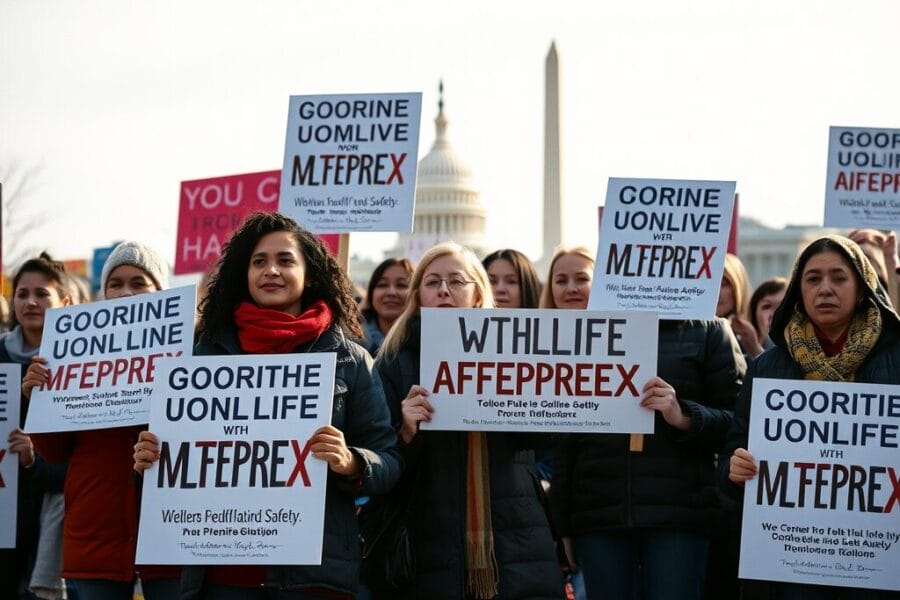Click here for AUL’s news release on this subject.
A coercive mandate requiring Illinois pharmacists to choose between exercising their First Amendment freedoms and protecting their careers and their families’ livelihoods has been finally been defeated.
In June 2005, AUL attorneys filed a legal challenge on behalf of Illinois pharmacists Luke Vander Bleek and Glenn Kosirog to the mandate issued by then-Governor Rod Blagojevich requiring pharmacists and pharmacies to dispense so-called “emergency contraceptives” “without delay.” Over the course of more than seven years of litigation, AUL successfully argued that the mandate violated the First Amendment to the U.S. Constitution, as well as well-established Illinois law protecting healthcare freedom of conscience.
Luke Vander Bleek’s Story
 In 1997, Luke Vander Bleek, with his wife Joan, became the owner of a small town pharmacy in Morrison, Illinois. Over the next seven years, Luke opened or acquired three other pharmacies in small Illinois communities, providing pharmaceutical services that would otherwise not be available in these underserved markets. Luke established himself as a well-known, well-respected businessman who never dispensed “emergency contraception” because of his conscience and religious faith.
In 1997, Luke Vander Bleek, with his wife Joan, became the owner of a small town pharmacy in Morrison, Illinois. Over the next seven years, Luke opened or acquired three other pharmacies in small Illinois communities, providing pharmaceutical services that would otherwise not be available in these underserved markets. Luke established himself as a well-known, well-respected businessman who never dispensed “emergency contraception” because of his conscience and religious faith.
On April 1, 2005, then-Illinois Governor Rod Blagojevich jeopardized Luke’s ability to continue offering his services in these small towns. Blagojevich, through executive fiat and without legislative approval, issued an emergency executive rule (“Rule”) that required community pharmacies licensed in Illinois to procure and dispense all forms of contraceptives “without delay.”[i] The Rule—made permanent on August 16, 2005—directly contradicted an existing law, the “Illinois Health Care Right of Conscience Act,”[ii] which provided broad conscience protection for healthcare providers including pharmacists and pharmacies.
Luke recognized that he could not, in good conscience, follow the Rule and would be forced to leave his life-long profession as a pharmacist rather than “stock and dispense products that [I] believe to be harmful to human life.” Risking his livelihood and his reputation, Luke made the laudable decision to take a stand against the Rule and, on June 8, 2005, AUL filed a lawsuit on his behalf challenging the constitutionality of the Rule.
Blagojevich’s Purposeful Targeting of Pharmacists Exercising Their Religious Freedoms
After issuing the coercive Rule in April 2005, then-Governor Rod Blagojevich made certain public statements emphasizing that the goal of the Rule was to coerce compliance by pharmacists who had religious objections to dispensing certain contraceptives. Blagojevich acknowledged that the Rule was prompted by the actions of individual pharmacists who had declined to fill certain prescriptions because of their religious or moral opposition to “emergency contraception.”[iii]
In a press release issued shortly after the Rule, Blagojevich plainly stated that “pharmacies are not free to let [religious] beliefs stand in the way of their obligation to their customers.”[iv]
In a letter issued to licensed physicians statewide on April 26, 2005, Blagojevich again affirmed that the Rule was in response to the actions of pharmacists opposed to “emergency contraception” and asked the physicians to report any pharmacists who refused to fill such prescriptions.[v] In a separate letter to the organization Family-Pac, Blagojevich again stated that the Rule was in reaction to pharmacists who disagree with certain methods of birth control, advising that if individual pharmacists refused to fill birth control prescriptions, their employers would face significant penalties.[vi]
Later, in March 2006, Blagojevich again acknowledged that the Rule was directed at pharmacists who objected to dispensing certain drugs on religious or moral grounds. At the time, he even went so far as to announce that pharmacists who hold such religious or moral views should find another profession.[vii]
AUL’s Involvement in the Litigation
On June 8, 2005, AUL filed suit against the Rule on behalf of Luke Vander Bleek, fellow pharmacist Glenn Kosirog, and several Illinois pharmacies (owned and operated by Vander Bleek and Kosirog).
Ed Martin, then-Director of AUL’s Center for Rights of Conscience, served as lead counsel in the case along with AUL Staff Counsel Mailee Smith. When the suit was filed, Life News reported,
“Luke Vander Bleek is suing to protect his rights as an American — his right to build a business, contribute to society as a health care professional, and to live according to his principles,” attorney Edward Martin, director of AUL’s Center for the Rights of Conscience, said.
“The Governor is trampling the rights of health care professionals and small business owners through his emergency rule,” Martin said.
The lawsuit, like two others that have been filed against [then-Governor Rod] Blagojevich since he announced the new rule, say his actions violate the Health Care Right of Conscience Act by compelling pharmacy owners to carry [“emergency contraception”]. That statute makes it unlawful for any public official to discriminate or punish any person who refuses to “participate in any way in any particular form of health care services contrary to his or her conscience.”
The suit says the governor’s rule essentially requires pharmacists to either violate their moral or religious beliefs or choose another career.[viii]
In 2006, AUL arranged for the American Center for Law and Justice (ACLJ) and Mark Rienzi, now a law professor at Catholic University and a member of AUL’s Board of Advisors, to take over as lead counsel in the case.
However, AUL remained actively involved in the case and subsequently filed 3 amicus briefs in support of Vander Bleek, Kosirog, and the pharmacies. Two of AUL’s briefs were filed before the Illinois Supreme Court and argued that both federal and Illinois law protected pharmacists’ freedom of conscience, that freedom of conscience is an historic right “steeped in the history and tradition” of America, and that the post-fertilization effect of “emergency contraception” is objectionable to many pharmacists (and, thus, their right to object must be protected).
Results of the Litigation
On April 5, 2011, after nearly five years of litigation and following an initial dismissal of the case (which was later reversed by the Illinois Supreme Court), an Illinois trial court found that the Rule violated the “Illinois Health Care Rights of Conscience Act” and the “Illinois Religious Freedom Restoration Act,” as well as the First Amendment of the U.S. Constitution.
On September 22, 2012, a state appellate court ordered that the Rule not be enforced against Luke Vander Bleek, Glenn Kosirog, and several Illinois pharmacies owned and operated by them.
In December 2012, the Illinois Attorney General announced that it will not appeal the case to the Illinois Supreme Court, ensuring a victory not only for Luke Vander Bleek and Glenn Kosirog, but also for the First Amendment, religious freedom, and the citizens of Illinois.
Growing Threats to Pharmacists And Other Healthcare Providers
In light of the Obama Administration’s recent mandate requiring virtually all health insurance plans to provide coverage for contraception and life-ending drugs such as “emergency contraception” and actions by other states such as Washington[ix] to coerced the consciences of pharmacists and pharmacies, Luke Vander Bleek is just one of thousands of individuals facing threats to their First Amendment freedoms and potentially being forced to make the decisions between following their consciences or maintaining their careers and protecting their families’ livelihoods.
Importantly, many pharmacists view their profession as one of healing and oppose the use of medication to end human life. In Luke’s own words: “I have spent my entire profession in pharmacy committed to easing suffering, curing, and diagnosing disease, and improving the quality of human life . . . . I will not practice in an environment, [in] which we are legally obliged to be involved in the destruction of human life.”[x]
[i] The Rule required Division I pharmacists to fill all legal prescriptions for contraceptives, along with the threat that any pharmacist that violated the Rule would face significant penalties. See 29 Ill. Reg. 5586. The Rule subsequently became permanent. See Ill. Admin. Code tit. 68, § 1330.91.
[ii] 745 Ill. Comp. Stat. Ann. 70/1 et seq.
[iii] See Menges v. Blagojevich, 451 F. Supp. 2d 992, 997 (C.D. Ill. 2006).
[iv] Governor’s Press Release (Apr. 13, 2005).
[v] See Menges, 451 F. Supp. 2d at 997.
[vi] Id.
[vii] Id.
[viii] See “Illinois Pharmacist Files Third Lawsuit Against Blagojevich on Plan B,” available at http://www.lifenews.com/2005/06/08/state-1079/ (last visited December 11, 2012).
[ix] The Washington Board of Pharmacy has issued rules compelling pharmacies and pharmacists to stock and dispense “emergency contraceptives.” The coercive rules have already been struck down by a federal district court.
[x] Statements made before the United States House of Representatives’ Small Business Committee on July 25, 2005, available at http://wwwc.house.gov/smbiz/hearings/databaseDrivenHearingsSystem/displayTestimony.asp?hearingIdDateFormat=050725&testimonyId=377 (last visited October 29, 2008).




